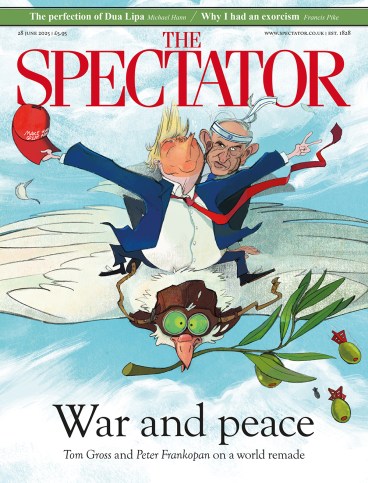
Moral support
Sir: All of Tim Shipman’s reasons for the PM’s reluctance to support Israel sound outwardly plausible, though, from my experience, the spook excuse, ‘The CIA wants us to keep the embassy open’, is plainly specious. Mossad is clearly all over Iran and they’re not relying on an embassy (‘Starmer’s war zone’, 21 June).
There is concern over what might follow a regime change, but no one is asking what happens if we don’t support Israel and the US. Instead there is some cobbled-together ‘de-escalation’ which leaves a diminished but still viable theocratic terror regime in place, but one now consumed by a desire for existential revenge. Add to this the allies in the CRINK+ bloc, especially North Korea and Pakistan, who may be willing to sell them the missing bits of Iran’s ‘weapons of mass destruction’ technology.
We may not have chosen the timing of Israel’s attack, but it is surely no surprise. As the US clearly had some ‘plays’ worked-out, so should we. What should be even easier is knowing which way to jump. Iran’s regime killed 136 British soldiers in Iraq, sponsored terror groups all over the Middle East and violently represses its own people. We should support, whole-heartedly, Israel and the US. This should be a no-brainer. That it is not reflects poorly on a government without any kind of moral compass and worse (because moral rectitude is not the only driver of international relations), any sense of Britain’s best interests.
Simon Diggins OBE Colonel (Ret’d)
DA Kabul (2008-10), MA to UN SRSG, Iraq (2004-05), Rickmansworth, Herts
Childish views
Sir: Matthew Parris’s suggestion that the emancipation of women has contributed to lowering birth rates is accurate. However, to suggest that ‘Falling birth rates are not a crisis’ (21 June) misses the point. China would wish that were the case. Due to its myopic one-child policy between 1980 and 2016, there are fewer children around to care for their ageing parents and grandparents. The children may well be richer, as Parris suggested, but that means China will suffer as its labour force shrinks. Optimism about China’s inexorable rise to become the leading superpower this century is misplaced: its population is set to halve by 2100. If that were to happen, its whole economy would tank, leaving other countries to gain more leverage on the global stage. It appears not only anti-humanist, but a form of self-harm to one’s country. I hope Parris doesn’t advocate a one- or two-child policy. It would be a logical extension of the argument that he is making.
Henry Bateson
Whittingham, Northumberland
Fit to be tied
Sir: Well done to Bijan Omrani for highlighting the decline in sartorial standards, in particular the casting aside of ties (Historian’s notebook, 21 June). The trend became noticeable to me some years ago when politicians started appearing on television wearing jackets without ties; a rather sad attempt to appear more appealing to the rest of us.
I wore a tie every weekday for 35 years while working in the civil service. However, at weekends and now just about every time I am out, I wear a cravat, which blends in with the colour of the shirt I am wearing. Cravats are comfortable, stylish and smart. I even wear one on the golf course. It does nothing to improve my swing, but I feel great. I commend them to your readers in particular and to politicians in general.
Brian Donaldson
Twickenham, Middlesex
Mass appeal
Sir: Why did Joseph Bevan declare that there is a war between traditional and post-Vatican II Catholics? (Letters, 21 June). Using words like ‘no tolerance’ is just inflammatory, as is being romantic about the Tridentine Mass, which he states will be swept aside. The new theology has its place, but it does not run in direct opposition to the Mass used from the death of Christ. We might recollect that Latin chant is the official music of the Catholic Church.
Pope Leo XIV has a great opportunity to reach out and proclaim inclusivity in our beloved Church, and I believe that he will. You are so wrong in your argument, Mr Bevan: we can live together.
Francis Osborn
Dorchester, Dorset
Opposites attract
Sir: I read with interest Dot Wordsworth’s item about the opposite meanings of the word ‘sanction’ (Mind your language, 14 June). In a similar vein, ‘to dust’ means both to remove the fine dry particles from a surface and ‘to dust off your skill set’. But then to ‘dust with icing sugar’ means to deliberately cover with a light coating of powder (which is what happens when you dust furniture and the airborne particles simply settle back down again).
Kay Bagon
Radlett, Herts
Pale ale
Sir: Flora Watkins in her article ‘Farewell to the old country’ (21 June) encapsulates why Melissa Kite of this parish moved to Ireland. Flora states that friends can provide a multitude of examples of suburban attitudes in the Cotswolds. Could I provide a key one? The country pub has been destroyed by the stripping out of anything old or traditional, so the pubs are a Notting Hill minimalist Farrow and Ball dream bereft of character and country charm, with modern European menus and prices to go with them.
Dinah Glover
Bethnal Green, London
Write to us: letters@spectator.co.uk







Comments